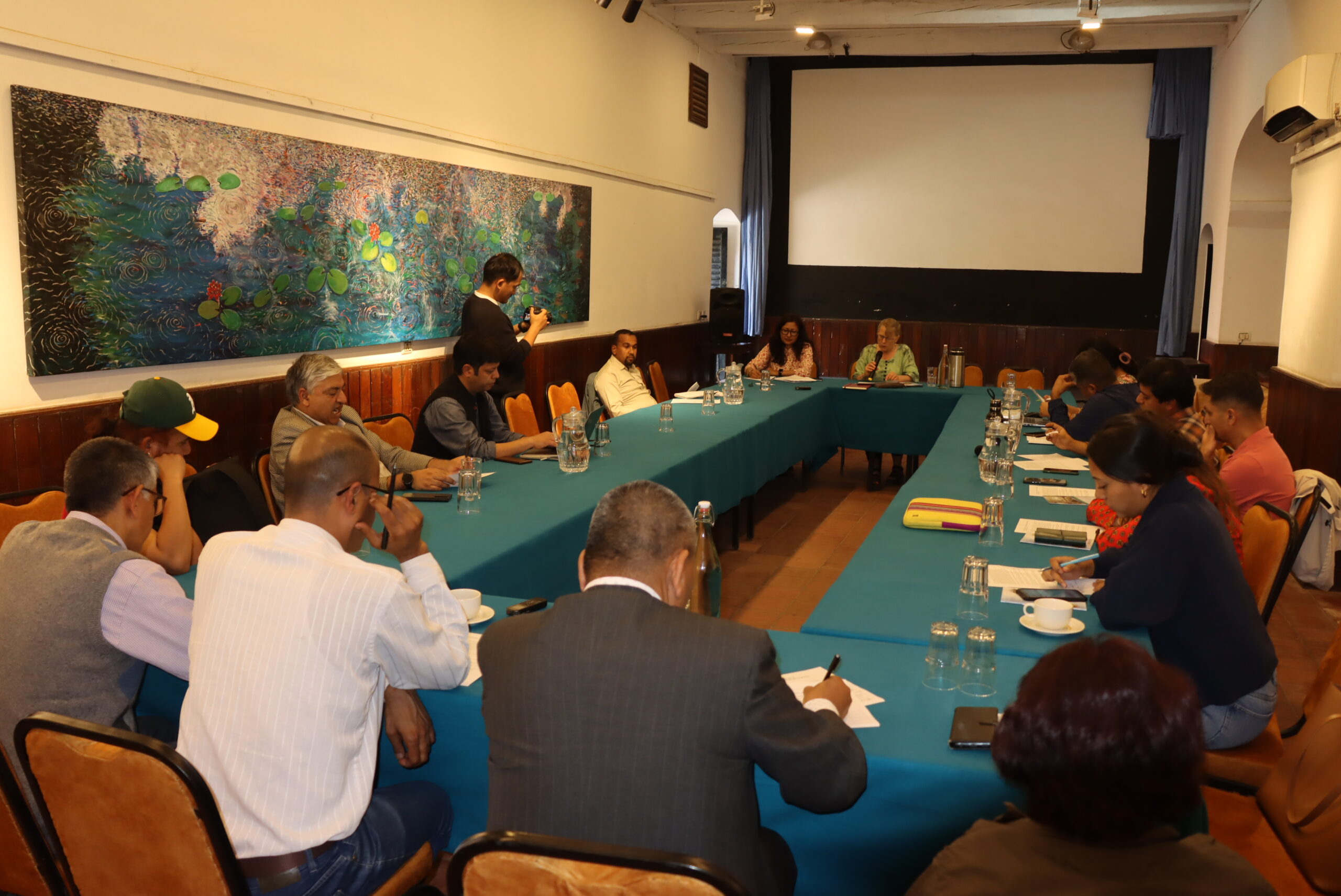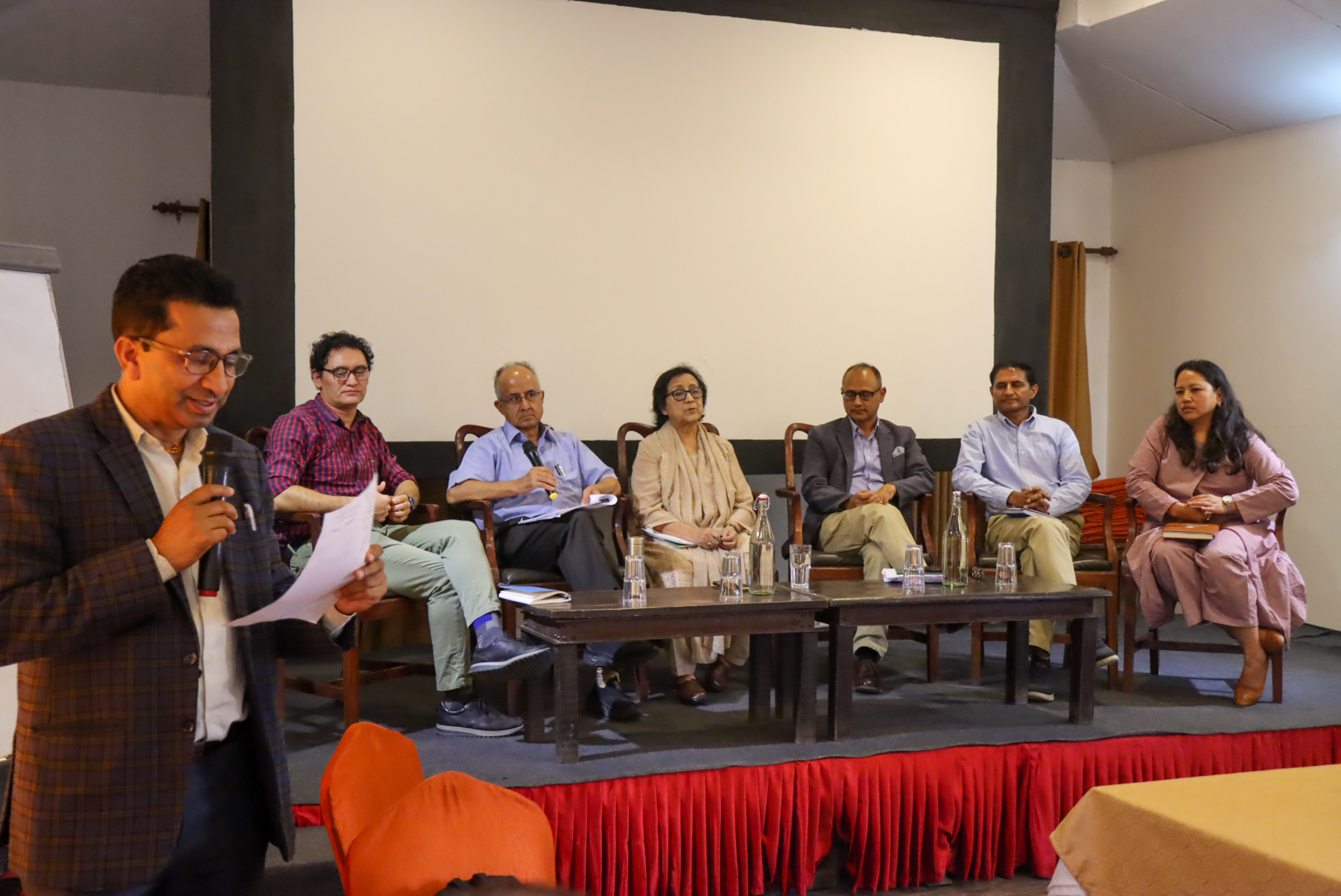With the travel restrictions being loosened up post COVID-19 pandemic, it is the very first time that scientists from the UK, and the four cities – Kathmandu, Quito, Istanbul and Nairobi engaged in the ‘Tomorrow’s Cities (TC)’ project, which aims to reduce risk of poor in tomorrow’s cities, came together in person in a 5-day long TC conference, held in Hotel Himalaya in Kathmandu from 31st October to 4th November 2022. Including the active participation of SIAS researchers Dr. Dilli P. Poudel, Dr. Netra P. Timsina, Dr. Mani Ram Banjade, Ms. Rojani Manandhar and Mr. Binod Adhikari, more than 70 team members of the project from more than 25 different universities and institutions attended the conference. With the Tomorrow’s Cities Decision Support Environment (TCDSE) – a computation tool to analyse future multi-hazard risks – being shaped up through detailed Work Packages (WPs) wise research activities and city deployments, which include both social and physical scientists and urban planners, the conference had an intensive discussion on how the TCDSE can be taken up in the new cities (e.g., Lumbini province new capital city, Nepal and Nablus, Palestine) with new teams having as much independence to run it as possible. It also aimed at producing an agreed plan for the final phase of TC project including the post-project legacy.
The conference kicked off with welcome remarks from Prof. John McCloskey, the Principal Investigator of the TC project, Prof. Mark Pelling, Deputy Principal Investigator of the project, and Dr. Suraj Lamichhane, Kathmandu city lead. The session commenced immediately with the presentation reflecting on the TCDSE process, associated challenges and learning primarily while using the Tomorrow Ville model. Following that, updates on the status and learning from each WPs were also presented by the package leads. Day 2 and 3 focused on the city’s progress and learning, as well as partnership working respectively with group exercises and mock-ups/role play stakeholders position exercises followed by the field trip to Khokana and Day 4 focused on capacity strengthening. The city leads, work package leads, and other scientists presented their experiences, learnings, opportunities and challenges faced during the last three and half years after the implementation of the project in July 2019. During discussions, in addition to the in-depth discussion on the TCDSE approach, two major challenges raised were envisioning informality and addressing social vulnerability issues in TCDSE. Other than the detailed updates from WP leads, the event also provided cross-city and cross-disciplinary co-learning opportunities. The role-play exercise, facilitated by the Quito team, not only pushed the scientists into critical thinking, but also helped to understand challenges and co-create potential solutions. The outcomes from the role-play exercise were also telecasted through live demonstrations on how the whole process of TCDSE is going to work and would work in the future.
In addition to providing a platform for UK-based PhD students to present their research to the participants and discuss the opportunities for career development, there were sessions with various external and policy stakeholders. The representatives from USAID/TAYAR Nepal, UK-AID/Nepal Urban Resilient program, Town Development Fund and ADB chaired by Mr. Anil Pokharel, CEO, National Disaster Risk Reduction and Management Authority (NDRRMA) and the panel discussion with the government officials from Department of Urban Development and Building Construction (DUDBC), Lalitpur Metropolitan City (LMC), Department of Mines and Geology (DMG), Department of Hydrology and Meteorology (DHM), NDRRMA and the Ministry of Federal Affairs and General Administration (MoFAGA), chaired by Mr. Padma Mainali, General Secretary, the Ministry of Urban Development (MoUD), reflecting on the issue of urban disaster risk, raised the urgency of understanding the present national context of DRR and the impacts being generated across the cities, so as the challenges as well as space for collaboration. Additionally, the CEO of the Lumbini Provincial Infrastructure Development Authority (PIDA) and the elected representatives (1 mayor and 2 rural municipality chairs) from the proposed capital of the province no. 5, the Deukhuri valley (Rapti Rural Municipality; Gadhawa Rural Municipality and Sitganga Municipality), a proposed new city for the TC’s research, also had an opportunity to share their ideas, aspirations and expectations from the project and express their commitment to collaborate with and support the project in every way possible. Members of the senior management team (SMT) of the project, Prof. John McCloskey, Prof. Mark Pelling and Prof. Hugh Sinclair along with the Nepal city leads and WP leads, had a separate meeting with these delegates from the proposed capital city of Lumbini (see लुम्बिनीको राजधानी बसाउनेबारे अध्ययन गर्न विदेशी विज्ञको टोली दाङ जाँदै).
During the event, the special issue of New Angle Journal on “Urbanisation and Disaster Risks in the Himalaya” published by SIAS in funding support from UKRI, GCRF, was also unveiled by the distinguished guests, Mr. Padma Mainali, Prof. John McCloskey, Dr. Hemant Ojha, Founding member of SIAS, and Prof. Dr. Sangeeta Singh from Institute of Engineering (IoE).
On the last day of the conference, the Project’s principal investigator, Prof. John McCloskey gave an overview and shared an understanding of the priorities for the hub’s final year and the hub’s legacy. “The efforts being made by every individual involved in the project account us to where we are today and will need as much effort and collaboration to take forward the legacy of the TC project” shared Prof. McCloskey. Prof. Mark Pelling in his concluding remarks stressed the need to explore ways of addressing the issue of social vulnerability in future cities. He further highlighted that capturing citizens’ voices, mainly the voices of the urban poor in methodology under the TCDSE is one of the crucial works that is being done in the project. Prof. McCloskey concluded the meeting with a vote of thanks to all the participants for their enthusiastic participation. Following the wrap-up, the whole team had an opportunity to explore Bhaktapur. The field visits to Khokana and Bhaktapur served as a refreshment break for the participants from hours-long sessions, an opportunity for the international city teams and hub members to explore and enjoy the traditional Newari ethnic community, the amazing landscapes and the culture and heritage of Nepal.




